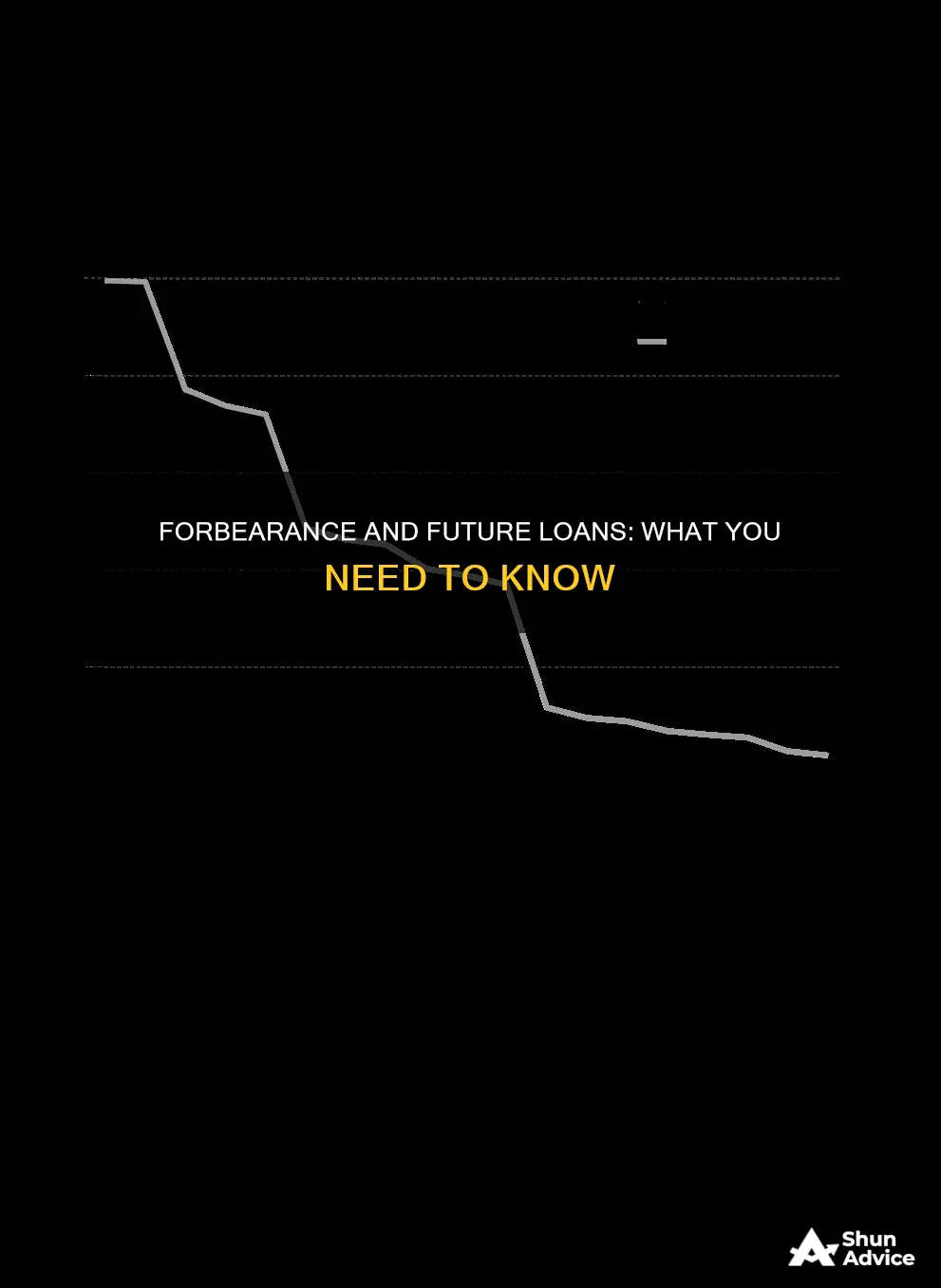
Forbearance is a short-term reduction or suspension of loan payments in response to temporary financial hardship. It is important to note that interest accrues during the forbearance period. Forbearance can be applied to different types of loans, including student loans and mortgages. The impact of forbearance on future loans depends on several factors, including the type of loan, the lender's reporting practices, and the borrower's ability to resume regular payments after the forbearance period. While forbearance itself may not negatively affect your credit score, missing payments prior to or after the forbearance period can harm your creditworthiness.
Does forbearance affect future loans?
| Characteristics | Values |
|---|---|
| Forbearance impact on credit score | Forbearance does not impact credit score as long as the lender marks the loan as "paid as agreed" and the borrower resumes payments after the forbearance period. |
| Forbearance eligibility | Forbearance is available for federally-backed mortgages, including those insured by FHA, VA, or USDA, or loans purchased by Fannie Mae and Freddie Mac. It is also available for student loans. |
| Forbearance period | The forbearance period can vary, but it is typically up to 12 months for student loans and up to 180 days for federally-backed mortgages, with the option to request an extension for another 180 days. |
| Forbearance and future loan eligibility | To be eligible for a new loan after forbearance, borrowers must bring all payments up to date and make at least three consecutive timely mortgage payments after exiting forbearance. |
| Forbearance and interest | Interest still accrues during the forbearance period, which may increase the total amount paid over the loan term. |
What You'll Learn

Student loan forbearance
Forbearance is a temporary postponement or reduction of student loan payments for those experiencing financial difficulties. The terms of forbearance depend on the type of student loan.
Federal Student Loans
Forbearance can be granted for up to 12 months at a time. Applicants must apply to their loan servicer, usually over the phone, and continue making payments until they receive confirmation that their request has been approved. Interest accrues on all loans, including federal subsidized loans, during the forbearance period. However, interest will not be added to the principal balance on Direct Loans.
Private Student Loans
Private student loan forbearance varies and is more limited than the federal program. The terms and fees associated with postponing private student loan payments are based upon the contract and applicable laws. They may be different for each servicer and may not be as favourable as the terms of forbearance available for federal student loans.
Fed's Open Market Operations: Buying and Selling Loans
You may want to see also

Mortgage forbearance
The impact of mortgage forbearance on future loans depends on several factors. Firstly, it depends on how lenders report the forbearance to credit bureaus. If the lender reports the forbearance as "paid as agreed," it should not negatively affect your credit score. However, if the lender reports delinquent payments, it could harm your creditworthiness. Therefore, it is crucial to understand the terms of your forbearance agreement and how your lender will report it.
Additionally, to be eligible for a new home loan after forbearance, you will need to reestablish yourself as a credible borrower. This typically involves bringing your payments up to date and making several timely mortgage payments consecutively after exiting forbearance. The funds used to bring your account current must come from acceptable sources, such as gift money, savings, or 401K disbursements.
During the COVID-19 pandemic, the Coronavirus Aid, Relief, and Economic Security (CARES) Act provided additional relief for individuals with federally backed mortgages. Under this act, borrowers could request a forbearance period of up to 180 days, with the option to request one extension for the same duration. The Federal Housing Finance Agency (FHFA) also offered payment forbearance of up to 12 months to borrowers impacted by the pandemic.
Financial Aid Packages: Understanding Loans and Awards
You may want to see also

Forbearance and credit score
Forbearance is a type of financial hardship plan that lenders use to help customers in need. It is a temporary change in payment terms for an account, which can include suspended or reduced payments. Forbearance is often used to describe mortgage relief, but it can also apply to student loans, auto loans, credit card balances, utilities, property taxes, and small business loans.
If you are granted forbearance, your credit score should not be affected as long as you stick to the agreed-upon schedule for resuming regular payments and making up for missed payments. However, lenders reviewing your credit report may be aware that you have experienced financial hardship. It is also important to note that if you missed a payment before forbearance approval, your credit score will be affected.
To be eligible for a new home loan after forbearance, you will need to re-establish yourself as a credible borrower. This means bringing all payments up to date and making at least three consecutive timely mortgage payments after exiting forbearance. The funds used to bring the borrower current need to be documented, and the source of funds must be what is normally accepted (e.g. gift money, savings, 401K disbursement).
During the COVID-19 pandemic, individuals with federally backed mortgages who were experiencing financial hardship due to the pandemic could request a forbearance period. This was also the case for student loans, with the Department of Education announcing a suspension of payments on federal student loans.
Explicit Costs: Are Loans Included?
You may want to see also

Forbearance eligibility
Mortgage Forbearance
Mortgage forbearance is available for homeowners dealing with an event that affects their ability to pay their mortgage, such as a job loss, natural disaster, or major illness. It allows homeowners to make lower monthly payments or skip payments for a specific period of time, typically not exceeding one year. To be eligible for a new home loan after forbearance, individuals typically need to re-establish themselves as credible borrowers. This may involve bringing all payments up to date and making several timely mortgage payments consecutively after exiting forbearance. The source of funds used to bring the borrower current must also be documented and from normally accepted sources, such as gift money, savings, or a 401K disbursement.
Student Loan Forbearance
Forbearance is also an option for student borrowers who are unable to repay their loans. It can be granted if the borrower does not qualify for deferment, providing temporary relief by reducing or suspending payments for up to 12 months. Student loan forbearance does not negatively impact credit scores, but late or missed payments prior to forbearance approval can affect credit ratings.
FAFSA Loans: Can They Run Out and What to Do?
You may want to see also

Forbearance and future borrowing
Forbearance is a short-term reduction or suspension of loan payments in response to a borrower's temporary financial hardship. It is important to note that interest accrues during the forbearance period. Forbearance can be applied to different types of loans, including student loans and mortgages.
Student Loans
Student loan forbearance provisions are included in federal loan agreements, so federal student loans will remain listed in good standing on credit reports during forbearance. As long as eligibility requirements are met and the agreed-upon payment schedule is maintained, credit scores should not be affected. Private student loans may or may not contain forbearance provisions, and if they do, they may be less lenient than those on federal loans.
Mortgages
Mortgage forbearance provides temporary relief by allowing borrowers to make lower monthly payments or skip payments for a specific period. It is intended for homeowners dealing with events such as job loss, natural disasters, or major illnesses. To be eligible for a new home loan after forbearance, individuals must reestablish themselves as credible borrowers. According to guidelines, a borrower who has exited forbearance is eligible for a new loan if all payments are brought current, and at least three consecutive timely mortgage payments are made.
Impact on Credit Score
The impact of loan forbearance on credit scores depends on how lenders report relief payments to credit bureaus. Forbearance is generally not considered negative information and should not harm credit scores as long as the borrower adheres to the agreed-upon schedule for resuming regular payments and making up missed payments. However, if payments are reported as delinquent, forbearance may negatively impact credit. Lenders are not required to report forbearance, and some may choose not to.
Fannie Mae: The Ultimate Loan Owner?
You may want to see also
Frequently asked questions
Forbearance can impact your credit score depending on how lenders report relief payments to credit bureaus. If payments are reported as delinquent, forbearance may harm your credit score. However, if your lender grants relief due to financial hardship, your credit score should remain unaffected as long as you follow the schedule for resuming regular payments.
Forbearance is a short-term reduction or suspension of loan payments in response to temporary financial hardship. You are expected to make up for all missed payments after the forbearance period, which can be in the form of a lump-sum payment or installments.
Mortgage loans and credit cards may offer forbearance. Mortgage lenders may grant forbearance to avoid the costly foreclosure process, while credit card hardship programs can include temporary suspension of payments or reductions in your annual percentage rate (APR).
According to some guidelines, a borrower in forbearance can be eligible for a new loan if all payments are brought current, and the borrower has made at least three consecutive timely payments after exiting forbearance. The source of funds for these payments must be documented and from normally accepted sources, such as gift money, savings, or a 401K disbursement.
Yes, borrowers can still make payments to their loan servicer during forbearance. These payments will be applied to future bills after the forbearance period ends. However, any payments made during forbearance will not count toward loan forgiveness.







